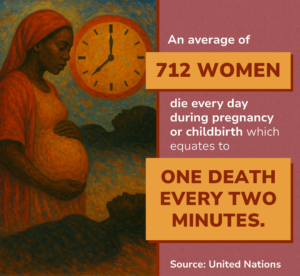A new United Nations report states that an average of 712 women die every day during pregnancy or childbirth, which equates to one death every two minutes.
Behind each number is a mother, a family, a community forever changed. These deaths are not inevitable.
They are preventable—with timely, skilled care and strong health systems that centre the needs of women before, during, and after childbirth.
In Nigeria, maternal mortality remains unacceptably high.
Contributing factors include
👉🏿 Inadequate antenatal care
👉🏿 Delayed access to emergency obstetric services
👉🏿 Critical shortage of skilled birth attendants
👉🏿 Systemic gaps in rural health infrastructure.

The solution lies in targeted, sustained investment in:
1. Skilled health professionals—especially midwives, community health workers, and obstetric specialists trained to manage complications and provide respectful care.
2. Comprehensive maternal care pathways—ensuring women are not just seen once, but supported continuously across pregnancy, delivery, and postpartum.
3. Stronger primary healthcare systems—with the right equipment, data systems, and referral capacity to respond rapidly when lives are on the line.
This is more than a matter of health issues.
It is a matter of equity, of justice, and of national development.
A mother’s life should not depend on her postcode, income level, or proximity to a tertiary facility.
We must act with urgency—and with clarity. To save mothers is to save nations.



